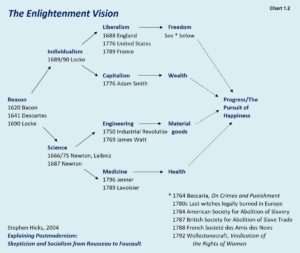Can Reason Alone Save Us?
 To quote blues musician Elmore James, we are “standing at the crossroads.” On one side, defenders of reason and individual freedom argue that the achievements of the Enlightenment—scientific progress, human rights, and democratic governance—are under threat. Conversely, a growing chorus claims these ideals have undermined community life, fostering alienation, moral relativism, and social decay. Two contemporary thinkers, Stephen Hicks and Patrick Deneen, offer sharply contrasting diagnoses of this crisis. In Explaining Postmodernism[1], Hicks argues that postmodern thinkers have rejected the Enlightenment’s commitment to reason, substituting truth and objectivity with relativism and power struggles.
To quote blues musician Elmore James, we are “standing at the crossroads.” On one side, defenders of reason and individual freedom argue that the achievements of the Enlightenment—scientific progress, human rights, and democratic governance—are under threat. Conversely, a growing chorus claims these ideals have undermined community life, fostering alienation, moral relativism, and social decay. Two contemporary thinkers, Stephen Hicks and Patrick Deneen, offer sharply contrasting diagnoses of this crisis. In Explaining Postmodernism[1], Hicks argues that postmodern thinkers have rejected the Enlightenment’s commitment to reason, substituting truth and objectivity with relativism and power struggles.
In contrast, Deneen’s Why Liberalism Failed[2] suggests that liberalism has failed not because it was abandoned but because its core principles—autonomy, individualism, and progress—have been too faithfully applied, unraveling the moral and communal fabric necessary for human flourishing. In this article, I will first summarize Hicks’s defense of Enlightenment liberalism and Deneen’s critique of its inherent contradictions. I will then compare their conclusions, highlighting a key tension in their prescriptions. Finally, I will consider a balanced view that both are essential to address the fragmentation of the modern age.
Hicks – Postmodernism Explained
To briefly summarize, Hick’s central thesis is that postmodernism arose as a rejection of the Enlightenment Project. It attacked the core philosophical foundations of the Enlightenment – human reason, science, individualism, and capitalism.[3] Through chapters four and five, we see Hicks’s
intellectual genealogy: Rousseau, Kant, Hegel, and Marx, leading to Nietzsche, Heidegger, Foucault, and Derrida. Throughout the book, he highlights the vision of the Enlightenment with its aim of human flourishing and happiness, as seen in Chart 1.2.[4]
In chapter six, Hicks is critical of postmodern thinkers for rejecting objective truth, rational discourse, and liberal democracy and for favoring relativism, power politics, and language games.[5] For Hicks, a renewed commitment to Enlightenment reason and classical liberalism is essential for human flourishing. He argues that a winsome, clear, and complete communication of the premises is needed to do this effectively, stating:
The Enlightenment was based on premises opposite to those of postmodernism, but while the Enlightenment was able to create a magnificent world on the basis of those premises, it articulated and defended them only incompletely. That weakness is the sole source of postmodernism’s power against it. Completing the articulation and defense of those premises is therefore essential to maintaining the forward progress of the Enlightenment vision and shielding it against postmodern strategies.[6]
Deneen – Liberalism Critiqued
Deneen has a provocative thesis: liberalism has failed, not because it was betrayed, but because it succeeded.[7] He argues that liberalism’s inherent principles erode community, virtue, and meaning, ultimately leading to the degradation of society. He shows a historical narrative that, from Locke’s emphasis on individual autonomy to contemporary hyper-individualism, technological control, and moral relativism, has created a society of individuals untethered from the things that give significance and security.[8] He illustrates the priority of liberalism is to liberate the individual by stating:
Hobbes and Locke both—for all their differences—begin by conceiving natural humans not as parts of wholes but as wholes apart. We are by nature “free and independent,” naturally ungoverned and even nonrelational.[9]
Thus, for liberal theory, while the individual “creates” the state through the social contract, in a practical sense, the liberal state “creates” the individual by providing the conditions for the expansion of liberty, increasingly defined as the capacity of humans to expand their mastery over circumstance.”[10]
Deneen’s critique of liberalism is that it unravels social bonds, replacing communal life with isolated, self-creating individuals.[11] In his conclusion, Deneen proposes not to return to the past but to learn from it while establishing local, virtue-based communities as antidotes to liberal fragmentation.[12]
Tension? or a Middle Way?
There is common ground on which Hicks and Deneen stand. Both have diagnosed a cultural crisis—whether framed as postmodernism or liberalism – and are pursuing a way forward they believe creates the conditions for human flourishing.
Hicks champions liberal values of the Enlightenment – reason, individualism, and free markets – as not only antidotes to postmodernism but as the way toward human flourishing. Deneen, by contrast, argues that these liberal principles, primarily individualism, have disembedded individuals from the social and ethical constraints present in a community, ultimately leading to the deterioration of that community and hindering human flourishing.
I think Hicks rightly warns against the postmodern rejection of reason and truth but may underplay how Enlightenment liberalism cultivates a fragmented society. Deneen offers a crucial corrective by showing that a flourishing society involves individual autonomy but requires embeddedness in moral traditions and communities.[13]
Conclusion
Reading Hicks’s Explaining Postmodernism alongside Deneen’s Why Liberalism Failed reveals the complex paradox at the heart of modern Western society. I am left with a couple of questions: Does Hicks’s return to Enlightenment ideals necessarily neglect the communal, virtue-centered life Deneen sees as necessary for human flourishing? I wonder if there are reparative practices that aid in re-embedding while harvesting the good from the Enlightenment Project? I think a synthesis is needed. We need to preserve rational inquiry and personal freedom while recovering virtue, ethics, community, and limits on autonomy.
______________________________________________________________________
[1] Stephen Hicks, Explaining Postmodernism: Skepticism and Socialism from Rousseau to Foucault, (China: Ockham’s Razor Publishing, 2014).
[2] Patrick Deneen, Why Liberalism Failed, (New Haven, CT: Yale University Press, 2018).
[3] Stephen Hicks, Explaining Postmodernism, 14.
[4] Ibid., 13.
[5] Ibid., 174.
[6] Ibid., 201
[7] Patrick Deneen, Why Liberalism Failed, 3.
[8] Ibid, 184.
[9] Ibid., 48.
[10] Ibid., 49.
[11] Ibid., 143.
[12] Ibid, 182-183.
[13] Ibid., 191-193.
12 responses to “Can Reason Alone Save Us?”
Leave a Reply
You must be logged in to post a comment.
Hi Chad,
From a Pastor’s perspective, how can Christians effectively balance the use of human reason as a God-given tool while ensuring that divine revelation remains the ultimate foundation for truth?
Shela, I have been giving some thought to your question, and from a pastor’s perspective, effectively balancing human reason and divine revelation starts with recognizing that reason is a gift from God, meant to serve—not replace—His revealed truth. Scripture acknowledges the value of reason while emphasizing the priority of revelation. For instance, Isaiah 1:18 invites us, “Come, let us reason together…,” whereas Proverbs 3:5 advises, “Trust in the Lord with all your heart and lean not on your own understanding.” The balance is achieved by submitting human reason to the authority of God’s Word while using it to explore, apply, and communicate that truth faithfully.
Hi Chad, great work connecting Deneen and Hicks and discerning the differences between their thinking.
How have you seen postmodernism affect your ministry in either positive or negative ways?
Christy, I have seen postmodernism’s most recent influence on the local church in the deconstruction and questioning of traditional beliefs. I have encountered several individuals challenging traditional doctrines and church governance. Some are questioning their faith and considering leaving, while others are seeking to reinterpret and adapt their beliefs.
Hi Chad, Thank you for this well-thought-out post. Reflecting on your question, I don’t think Hicks’s return to Enlightenment ideals would necessarily undermine the communal, virtue-centered life that Deneen sees as essential for human flourishing. One of the key insights I’ve gained in this program is that the healthier we are as individuals, the better equipped we are to lead and contribute to a virtue-centered community for the good of society. That does require a degree of focus on individualism—on shaping our minds and character.
Where Deneen’s concern with individualism and liberty resonates most with me is when those ideals exist without restraint, allowing people to pursue whatever they desire without accountability—something postmodernism seems to encourage. In that sense, I see modernist ideals as working in tandem with what Deneen is advocating rather than in opposition to it. But I completely agree—a synthesis is needed.
Chad,
Great job comparing Deneen and Hicks. I appreciated looking at them together here. Where do we go from here? Have you seen postmodern ideologies in the church? If so, how have you addressed them, either good things or negative?
Adam, I have seen postmodernism’s influence on the local church with individuals deconstructing and questioning traditional beliefs. I have encountered several individuals challenging traditional doctrines and church governance. Some question their faith and consider leaving, while others seek to reinterpret and adapt their beliefs.
Hi Chad, Thanks for bringing Deneen into this conversation. I hear you saying a balance is needed in preserving the good of both postmodernity and reconnect with the good of the enlightenment ideals. Yet, what approach in your context might make sense to you as a place to start?
Great question Diane. In my context (northwest Montana) there’s a strong value for individualism and self-reliance, but also a growing hunger for authentic community. A good starting point here would be to foster relational restoration—practices of hospitality, shared life, and neighborly care—while reintroducing the value of truth and virtue in ways that are lived, not just taught. People here respond more to embodied community than ideology, so local acts of love and wisdom can reconnect us to both Enlightenment ideals rightly ordered and the communal vision we’ve lost.
Hey Chad! I loved the intervweaving of Deenan and Hicks. If a congregant were to ask you how should they view Hicks views in their daily context, what advice would you share?
Daren, that is a good one. I’d say Hicks encourages us to focus on becoming wise and good, not just gaining knowledge. In daily life, that means paying attention to what shapes our hearts, like habits, relationships, and what we consume through screens, and aiming to live with purpose, virtue, and care for others, not just chasing success.
Chad, as always, an excellent analysis of a challenging text.
I’m delinquent, so you don’t need to reply. But as I consider the paradox you describe at the end, you suggest a balanced approach that preserves rational inquiry and personal freedom while also fostering virtue, ethics, community, and limits on autonomy. I wonder if this synthesis could potentially address the fragmentation observed in modern society.